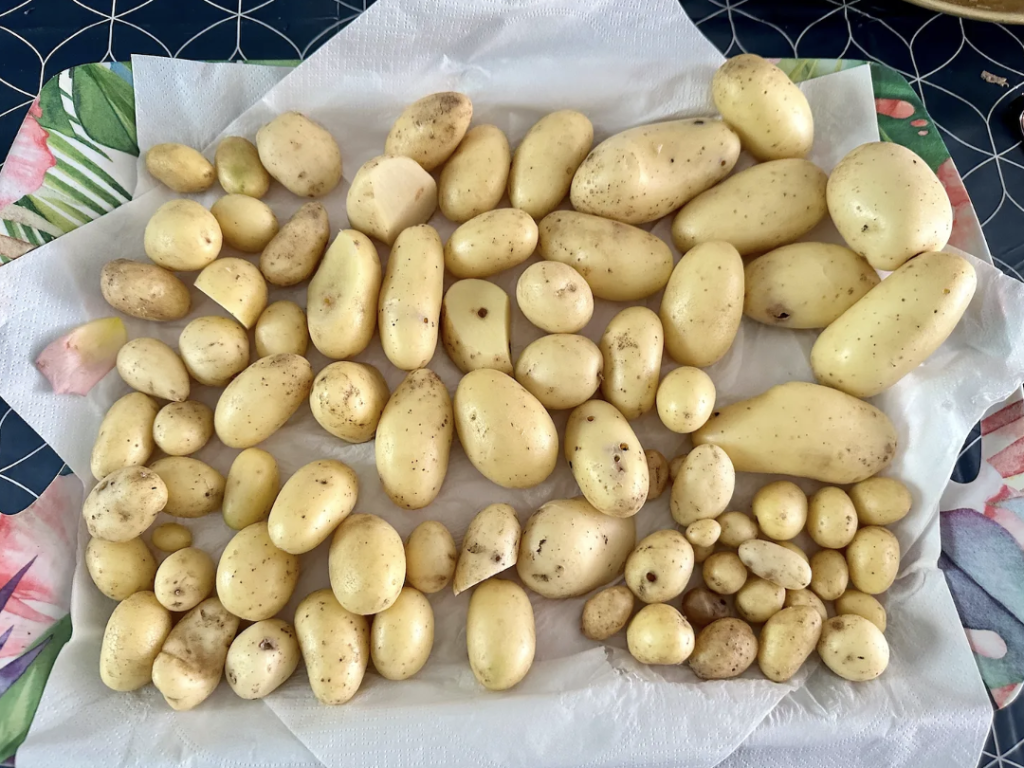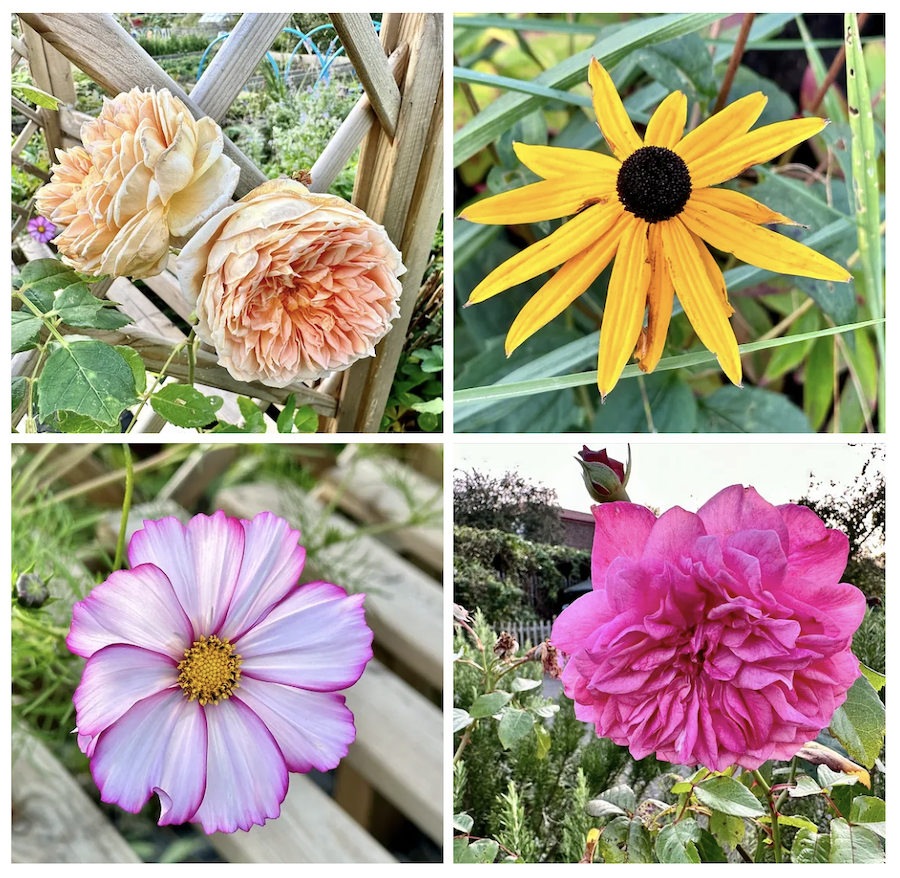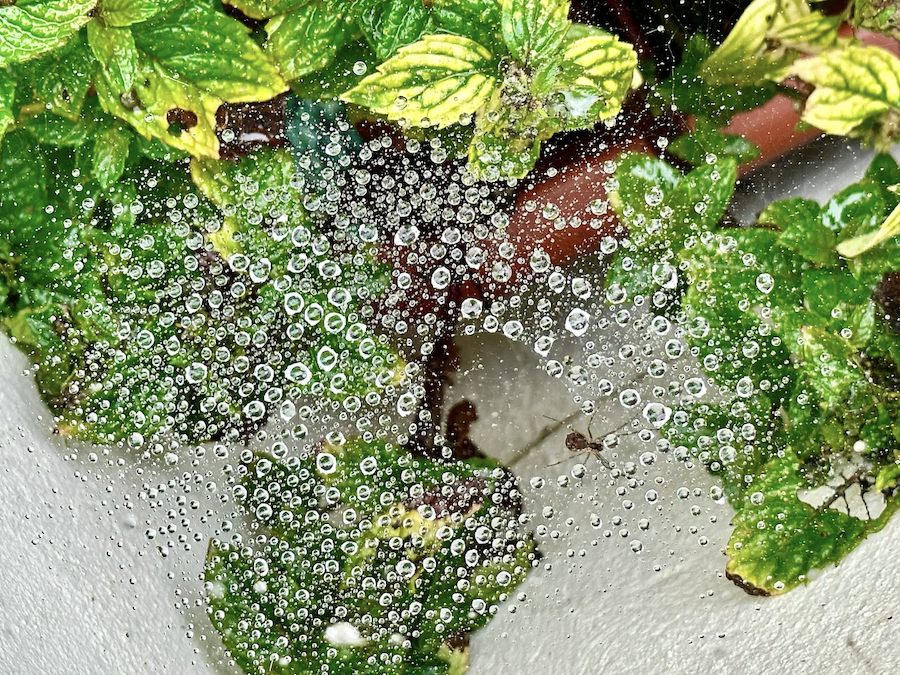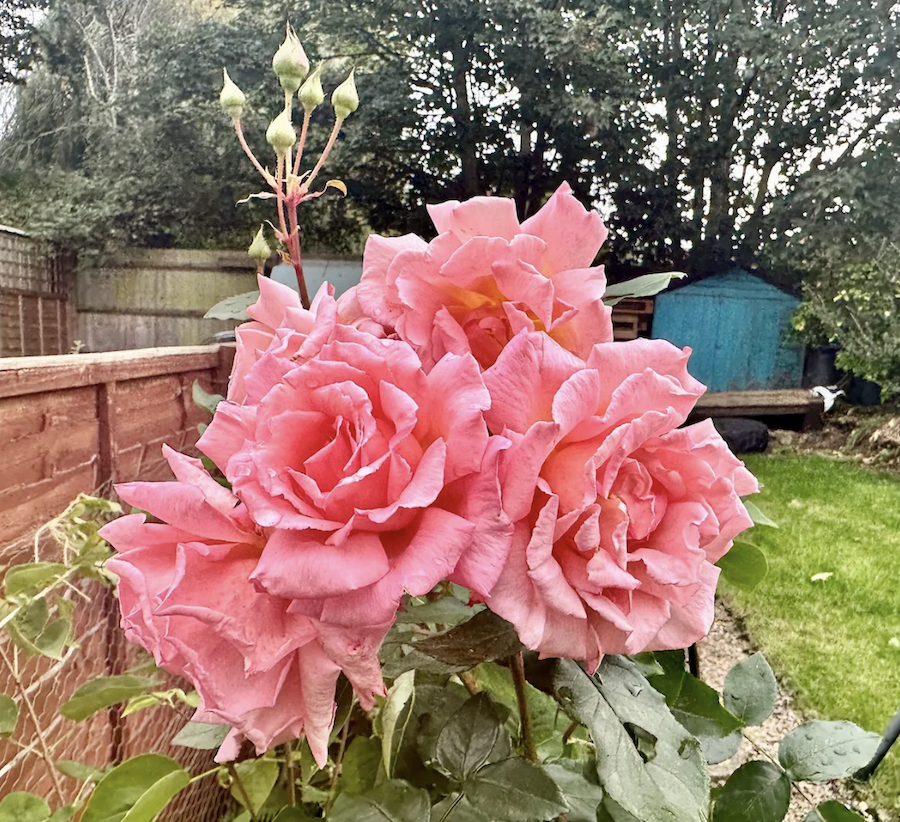On the unknown
Good morning. I hope this finds you well. This week, summer ended, and autumn took over quite drastically. Last week and weekend were hot, way too hot, and I was worried that all our roses would open up too much and later suffer in the first frosts (sometimes to be expected mid-Ocotber in the UK). This morning is close to zero, actually.
I used the time to continue preparing the allotment for wintering. I spend a sunny evening lifting the last batch of potatoes – in enormous gratitude that Mother Earth is still offering her nurturing to us.

Many times in the last few days, I was resting on the bench beside my mini meadow, admiring the lush flowers, especially our new roses. Yes, this year, we have ordered a few from David Austen Roses, even though I strongly disagree with their propagation limitations. The bushes have been “copyrighted” for 13 years to limit the propagation and free sharing of plants. Isn’t it sad that we prioritise profit this way and create a sense of excellence? In the long run, this will not pay off, especially as many realise those limitations. There is more value in free and in the affordable – it’s loyalty and humble humanity. Our bag of seeds for next year arrived safely from the Real Seeds Company, and I can honestly say that we are spending way more money there to invest in the good people who support free access to Nature and nurture.

Two things preoccupied me this week. One is our unnoticed relationship with the world around us, especially with technology, and the role of psychology in the process. I read an article in the leading counselling association journal here in the UK, which really badly mixed AI with VR and other technologies and, at some point, compared the AI data sets to “nothing more than a sophisticated toaster”. That statement was made in our preparations for AI threats as if it was yet another technology we could bend to submission. Psychology has a bad reputation and a proven history of wanting to fit people into a mould of a diagnosis and separate us from other living beings and the inanimate world around us. For the last decade, we have been rolling out this approach on digital technologies too. The issue I have with this approach is that it disconnects us from our own relational sense of self and our sense of belongingness in the world, too. That separation causes us pain. By the way, here is a more sophisticated way of making this point.
I feel lost in the world of modern Western psychology sometimes for this reason, which is why I enjoy the We Will Dance with the Mountains course so much at the moment, especially the lectures from the lead and guest teachers. The internal and external disconnect challenge means we forget how it feels to belong and relate. We do have a relationship with technology; it changes us in the process, too – especially our interactions with large AI data sets. We play, we dance, we get informed, and we shape our future selves in those interactions, so we need to become aware of that process. Otherwise, we will be stuck in a tornado of movements of isolation, submission and disconnection from our humanity. Comparing the most relational tech so far to a toaster is an example of that.
We refuse to acknowledge the relationship with technologies of our digital times because they are largely unknown. We do not know their impact on our present and our future. And yet, so is everything else. We cannot trust the science and need to sit with that. We cannot count on human kindness all the time – it’s enough to open the news – and yet, we need to build relationships and form communities.
Báyò Akómoláfé summed it up well during the last lecture: “If you know what the end of the world is going to look like, you are in the wrong place.”
Tell me that you feel nothing when you read the notification I have received recently here, on Substack:

The universe is now following me on Subtack. I feel entertained but also somewhat moved – wouldn’t it be nice if the entire universe was so interconnected that our every experience, every emotion, and every action meant something in the great web of things? Wait…maybe that’s how we fit into the story of the universe anyway?

I am pretty philosophical this month, especially now that the autumn is here. It is again a time of enormous harm being done in the world, and I am sitting with many conflicting emotions. The most accessible, most soft place for me to start is right here, right now. Recently, I have witnessed and experienced incredible holding from people focused on building bridges and finding life-saving solutions. I have also experienced two people who could not contain their egos in interacting with me. I usually nod and politely step away to reflect, and what I have noticed this time is the incredible correlation between Western Euro-patriarchal knowledge and misuse of power (seemingly neutral condescending “rational” tone with incredibly noticeable undertones of entitlement and rage hitting my embodied self). I step away and notice just how much of the destruction those behaviours leave behind them. And how the audiences switch off feeling the gravity of the silent attacks on their shoulders. And then you wonder why reading the news is too much.
Sometimes, some people do not make a connection between here and now, how we relate to each other, and how those huge tragic events unfold. And yet, there is something similar there…the lack of humility, kindness and care and addiction to binary simplicity. The lack of acknowledgement that we are small in the grand spiderweb of the universe and that we know very little indeed.
So what can we do to move forward, heal and consider kinder, beautifully complex, unknown futures? Well, yes, we need to reflect and sit in the uncertainty. However, we also need to have a new proposal to work towards. So I really like Nora Bateson’s suggestion:
“I would suggest a more modest motivation, which is neighter to completely understand nor to label as mystery, but to simply deepen our understanding. The deepening is not finding the answer, not looking for a final truth, but becoming increasingly familiar with the many complexities that surround all that we study.”

Reflection
Today, I invite you to explore your relationship with innovative technologies, for example, Virtual Reality, smart tech (your smart watch) or AI. Those emerging ways of interacting with content and other humans can often feel like entering unknown spaces. That can trigger not only powerful emotions but also profoundly embedded biases and past traumas.
So to remain open to new experiences and to facilitate learning and understanding, which is a pre-requisite of aware use, we need to pause and reflect: how do we feel IN RELATION to those new items/systems present and impacting our lives? Here are a few ideas for reflection – in any format that suits you:
- Do you have a relationship with surrounding technology – do you react and respond to your printer, computer, or coffee machine? Does it make sounds to communicate with you? Does this technology impact how you feel and act in the day?
- How do you react and respond when your tech fails you? How do you hold the tech glitches? What is triggered in you? What helps you move forward, fix, and restore the functionalities and your bodily and emotional balance?
- How are those digital technologies impacting your communities and the world around you? What shifts moving forward would you like to see in how your tribe relates to those technologies?
(I am off to spend a day a long-awaited family visiting us in Bristol. I wish you all a soft Sunday!)
This post was originally posted on Substack in our Syl’s Liberation Psychologies Newsletter.

